Column

Image: Collected
Bangladesh and Turkey have a very long history of deep association with each other, with close cultural, including deeply spiritual influences, interacting as bonding glue. The Turks first came to Bengal in the beginning of the 13th century when Ikhtiyar Al-Din Muhammad bin Bakhtiyar Khilji, a Turko-Afghan military General led the conquest of the eastern Indian Bengal and Bihar regions between 1197-1206. He first conquered Bihar, then advanced into Bengal through Nabadwip (in Nadia, present day West Bengal), from where he advanced to establish a Muslim suzerainty over Gaur, the ancient capital of Bengal which he renamed as "Lakhnauti". He set himself up as ruler of this newly conquered space after defeating the ageing Buddhist ruler, Lakshman Sena, and then expanded his authority to encompass adjacent territories. His advent into this region effectively ended the long-held Buddhist sway over the region.
For better and more efficient administration, Bakhtiyar divided the areas he occupied into several "iqtas" or revenue collection zones, that were undoubtedly the precursors to the revenue collecting system put in place by the Moghuls and then later supplanted by the severely extractive "collectorate order" of administration put in place by the British rulers. Bakhtiyar Khilji placed these "iqtas" under administrative control of his three lieutenants - Ali Mardan Khilji, Muhammad Shiran Khilji and Husamuddin Iwaz Khilji.
Additionally, he established mosques for prayers for his Muslim followers, madrassas for mass education, and Khanqahs for Sufi 'tariqahs' (literally, pathways toward direct knowledge of the Divine Reality) that became centres of Islamic learning and propagation of the new faith that he introduced to the region. Bakhtiyar died in 1206 and was buried at Pirpal Dargah at Narayanpur in West Dinajpur. Following his death, an internecine power struggle ensued between his contending lieutenants. In 1212 CE, Khilji Malik Iwaz finally prevailed over all other rivals and assumed sole power assuming the title Ghiyasuddin Iwaz Khilji. Ghiyasuddin undertook numerous welfare activities, constructed highways, and put in place flood control measures. For strategic reasons, he built a fort and organized a flotilla of war ships, reflecting his strategic military acumen for consolidating firm control over the conquered territories.
During Khilji rule over Bengal, Delhi Sultanate was ruled by Ilbari Turks, who were rivals to Khilji Turks ruling Bengal. The Ilwaris aspired to possess the Khilji realms of greater Bengal, already famed for its myriad bounties. Sultan Iltutmish Ilwari of Delhi Sultanate overthrew Ghiyasuddin Khilji in 1227, and immediately declared Lakhnauti to be a province of the Delhi Sultanate. Bengal was ruled by the Ilbari Turks from Delhi for the next sixty years. Following Iltutmish's death in 1236, Turkish nobility held sway over power and played role of kingmakers. Governors of Bengal sent by Delhi belonged to Turkish nobility. Following death of Sultan Ghiyasuddin Balban Ilbari in 1287, Khilji Jaludding Firoz overthrew Ilbari rule and re-established Khilji ascendency in Delhi in 1290. However, Balban Ilwari's son, Bugra Khan assumed power and assumed title of Sultan Nasiruddin Mahmud. The rivalry between these two opposing Turkish dynastic branches continued unabated and marked relations between Bengal and Delhi. During 1290-1324, the Muslim Kingdom of Bengal witnessed expansion into Satgaon, Sonargaon, Mymensingh and Sylhet. Notably, with the Turkish expansion to Sylhet another significant landmark event took place - the arrival in Sylhet in 1303 of Sufi saint Shaykh al-Mashāʾikh Makhdūm Shaykh Jalāl Mujarrad bin Muḥammad Kunyāī, known in reverence by Bangladeshis as the Sufi awlia (saint) Hazrat Shah Jalal. Hazrat Shah Jalal is said to have hailed from Konya (Quniah) now in modern Turkey where his mother Syeda Haseenah Fatimah lies buried. His father, who died when Hazrat Shah Jalal was five years old, was a contemporary of Sufi saint Jalaludding Rumi of Rum sultanate (modern Turkey). Recently, Konya and Sylhet have been declared as sister cities based on this historical link between Bangladesh and Turkey.
The squabbling and tussle for overlordship between the Khilji and Ilbari Turkish rivals effectively ended in 1324 when it was replaced by yet another Turkish line. Sultan Ghiyasuddin Tughlaq of Delhi invaded and captured Lakhnauti, and established Tughlaq (representing Qarhaunah Turks) rule over Bengal, until 1338, when the earlier configuration set up in Bengal started slowly coming apart. In 1338, Fakhruddin Mubarak Shah declared independence at Sonargaon.
Lakhnauti followed suit and declared independence under Sultan Ali Mubarak. But he was replaced soon after by Haji Iliyas, another Turko-Afghan adventurer from Sijistan who took over the Lakhnauti throne and assumed title of Sultan Shamsuddin Iliyas Shah. It is worth noting here that most Turko-Afghans described above were descended from the Central Asian Turkic tribes who had entered Afghanistan since earlier times but came into prominence in the middle of the 10th century when a former Turkish slave Alptegin seized Ghazna. Alptegin was succeeded by Subuktegin who extended conquests to Kabul and the Indus. Subuktegin's son, Mahmud of Ghazna who came to the throne in 998 conquered Punjab and Multan and carried raids into the heart of India (Britannica). The Turkish generals who entered Bengal were essentially adventurers seeking further conquests and expansions.
With Shamsuddin Iliyas Shah's coming to power, Turkish rule in Bengal entered a new phase of expansion. Iliyas Shah united whole of Bengal and transformed the kingdom of Lakhnauti into Kingdom of Bangalah. He and his descendants ruled over Bangalah until 1487, except for a brief 23-year interregnum between 1415-1435, when house of Raja Ganesh held power (Raja Ganesh was a Hindu landlord of Bhaturia and a Hakim (Governor) of Dinajpur in Northern Bengal, who took advantage of the weakness of the Ilyas Shahi dynasty and seized power). Raja Ganesh mixed freely with Muslims and his son who converted to Islam succeeded him as Sultan Jalaluddin Muhammad Shah. Sultan Jalauddin Fath Shah was last ruler of this dynasty and with his assassination by his Abyssinian slave Turkish rule over Bengal ended in 1487.
Turks were followed briefly by Abyssinian rule, but Bengal remain independent, until 1538 when Sher Shah ousted the Husain Shahi dynasty and established Afghan rule. This also ended Bengal's independence. Afghans ruled over Bengal until 1576, followed by Mughals who held sway until end of Muslim rule.
Turkish legacy in Bengal -- of lasting nature, still extant and evident even today
Notably, Turks who remained behind after Turkish dynasties' end, merged with local society, while some may have joined successive rulers (Afghans/Moghuls). Particularly under Moghuls, people of Turkish blood played a very prominent role in the filed of arts, statecraft and growth and expansion of Sufi influence on societal development.
In fact, Turkish rule over Bengal proved to be a boon for Bengal. It played a significant role in the establishment of a Muslim society in Bengal, giving the development of Muslim culture a definite shape. Turkish rulers built numerous mosques, madrassahs and established "Khanqahs" that acted as fount for expansion of Sufi traditions and cultures, establishing deep societal roots and flourishing. They patronized Muslim ulamas and Sufis in their religious pursuits.
It would appear that Turkish rulers and their followers who came to Bengal perhaps as adventurers came not as marauders but to stay and make a home in these new lands. They had burnt their boats behind them, to make Bengal their new home. They neither transferred their wealth out of Bengal nor thought of leaving the country. They enriched architectural growth and development, and calligraphic skills among local artists and artisans. They also invested their energy and resources and transferred skills and knowledge into various infrastructure development activities, including building forts for protection of their new homeland and subjects. In a region notoriously at the mercy of numerous mighty rivers prone to flooding and making conventional overland communication difficult, they built bridges, dams, dykes, and embankments to serve as flood control measures as also augmenting irrigation of fallow land. They also, notably, developed water-borne transportation for goods and people across the realm. They, by and large, appear to have had a liberal disposition, because they appointed non-Muslims in senior or authoritative posts in administration and governance, as well as in the army. Recorded history of the period shows Turkish Sultans also patronized both Persian and Bangla arts and literature, and even Hindu poets, conferring honorific titles on them. All these actions and overall liberal behaviour towards local population These influenced the Muslims of Bengal to supporting the Turkish National Struggle against colonial powers' interference or attempts at domination over Turkey. This was reflected most poignantly by Kazi Nazrul Islam, notably, penning his epic poem "Kamal Pasha" - incorporated in curriculum of Bangladesh schools and influencing Bengali poetry and literature and political outlook. Apart from Kazi Nazrul Islam, rebellious poets and writers Kazi Abdul Wadud, Ismail Hossain Siraji, Kazi Motahar Husain and Abul Fazal also supported Ataturk's reformist revolution. A high school named as "Atatürk Model High School" in Feni was set up on January 6, 1939, 54 days after Ataturk's death on November 10, 1938. In more recent times, a Turkish language center, "Mustafa Kemal Turkish Language Center" was established in Dhaka Cantonment. Bangladeshi national artist Sheikh Afzal painted a beautiful Ataturk portrait, which is on display in the National Museum. Principal of Dhaka College, Ibrahim Khan wrote a theatrical play named "Kemal Pasha" in 1925 that gained huge success and contributed to the love and respect of the Bengali people toward the Turkish nation and its independence movement led by Ataturk.
This support of the Bengali people during the Turkish National Struggle is still remembered with gratitude by the Turkish people. Both peoples may be said to share same ethos of warmth and hospitality to each other.
Bilateral relations post-independence
Because of Turkey's close relations with Pakistan as fellow members of the RCD and CENTO, Turkish recognition of Bangladesh as an independent, sovereign state was hostage to the political dynamics of those ties. In the context of the Cold War global division into two camps, Turkey, and erstwhile Pakistan both, by virtue of close ties with US-NATO alliance, also naturally fell on the opposing side of the divide. However, Turkey was also a member of the OIC, to membership of which Bangladesh on its independence also aspired, having the third largest Muslim population in the world at the time.
Turkey recognized Bangladesh on 22 February 1974 when the Organisation of Islamic Cooperation (OIC) (formerly Organization of the Islamic Conference) Summit which was held in Lahore. The Turkish Embassy in Dhaka was opened in 1976 and the Embassy of Bangladesh in Ankara in 1981. Numerous state and high-level visits were exchanged between leaders of two countries that helped to steadily develop the foundations of bilateral relations between independent Bangladesh and Turkey. These visits included, inter alia:
• Former Bangladeshi president Ziaur Rahman became the first Bangladeshi head of state to visit Ankara.
• In 1986, the then Turkish prime minister, Turgut Ozal paid a visit to Bangladesh.
• Turkish President Suleyman Demirel joined Nelson Mandela and Yasser Arafat at the silver jubilee celebrations of Bangladesh's independence in 1997. In 1998, the two countries co-founded the Developing 8 Countries group.
• Turkish president Abdullah Gul paid an official visit to Dhaka in2010.
• Turkish Prime Minister Recep Tayyip Erdoğan paid a visit to Dhaka in 2010.
• Bangladesh Sheikh Hasina, accompanied by the then Minister of Foreign Affairs, Ms Dipu Moni, visited Turkey to participate in the Fourth United Nations Conference on the Least Developed Countries which took place in İstanbul on 9-13 May 2011.
• Prime Minister Hasina also paid an official visit to Turkey on 10-13 April 2012 upon the invitation of the then Prime Minister Erdoğan.
In 2016, the diplomatic relationship between two countries became complex when Bangladesh denounced Turkey's consecutive requests to free several Bangladeshi Jamaat-e-Islami leaders who had been convicted for war crimes during Bangladesh Liberation War by the International CrimesTribunal in Bangladesh and eventually executed. Following the execution of the Jamaat leaderMotiur Rahman Nizami, Turkey withdrew its ambassador to Bangladesh. However, after Bangladesh's condemnation of the coup d'état attempt to overthrow the Erdogan government, relations began to improve when Ankara sent a new ambassador to Dhaka. After arrival, the new Turkish ambassador remarked, "Bangladesh had helped Turkey by expressing its support to Erdogan's government after the failed coup attempt." The ambassador commented that the relations between the two countries have become normal. The ambassador also expressed Turkey's willingness in helping Bangladesh to control militancy in the country. During the Rohingya crisis, where the Muslim Rohingyas were being expelled from Myanmar,Turkey donated millions of dollars to the government of Bangladesh in order to aid the Rohingyas refugees in Bangladesh. In September 2017, First Lady Emine Erdogan visited and helped provide relief in the shelters of the Rohingyas and promised more co-operation and aid toBangladesh.
Former Prime Minister Binali Yıldırım's visited Bangladesh on 18-20 December 2017. The Prime Minister held meetings with President Abdul Hamid, and Prime Minister Sheikh Hasina. He visited Rohingya Camps in Cox's Bazaar and demonstrated support for Bangladesh's stand and actions in respect of the Rohingya crisis.
The most recent Presidential level visit from Bangladesh to Turkey was that of President Abdul Hamid on 13 December 2017, in the context of the OIC Extraordinary Summit in Istanbul. During the summit, the two Presidents also held a bilateral meeting.
Current relations: extent and depth
Turkey responded notably with medical assistance during the pandemic, responding almost immediately after its onslaught in Bangladesh. As alluded to earlier, Turkish government has been aiding Rohingyas with two medical units stationed in the refugee camps since 2017.
Bangladesh and Turkey signed a joint protocol on trade and investment in 2012. The Bangladesh-Turkey Joint Economic Commission has been holding biennial meetings to discuss theways for increasing bilateral trade and investment.
Since 2012, Bangladesh and Turkey have been in talks to sign a free trade agreement but signing of the agreement was put on hold due to the complications relating toTurkey's bid for accession to the European Union. Bangladeshi exports to Turkey have been dominated by apparel products. Turkey sells cotton, Machinery, and chemicals for garment industry. It buys $300 million worth of jute from Bangladesh. Foreign Ministers of two countries visited each other's capitals in 2020 and 2021 respectively to inaugurate new embassy complexes in Ankara and Dhaka. They also committed to enhance Current Trade Level from $ 1.2 bn to double it in next five years.
Turkey is set to become a significant investor in Bangladesh. Investment in electronics sector by Arcelik of Turkey who acquired majority holding of Singer Bangladesh includes tech transfer. Turkey seeks to identify one special Economic zone in Bangladesh to bring in more Turkish investments. The shipbuilding industry of Bangladesh has been identified as a potential sector for Turkish investment. However, a business dispute resolution mechanism is needed urgently.
Turkey provides 50 scholarships every year for Bangladeshi students. Presently. There are 680 students in Turkey (2019-20). There are officially documented over 1000 Bangladeshi nationals resident in Turkey currently.
Tourism is increasing significantly. Additionally, Turkey has a very strong and competent healthcare infrastructure, ranking among top 5 countries globally, and therefore an increasing medical tourism destination. Notably, it has developed its own Covid vaccine (TurkoVac), which is currently in phase 3 trial. President Erdogan has announced that he will make the vaccine available globally and offer joint production to other countries. It would be in Bangladesh's interest to may enter Joint Vaccine development and production of. TurkoVac in Bangladesh.
Defence cooperation
Bangladesh is set to become one of the top defence equipment clients of Turkey in next few years. Bangladesh had signed an agreement with Turkey on military training, education, and joint cooperation between forces of both nations on 10 March 1981 at Dhaka. In recent years, there has been growing Defence / Military cooperation between the two countries, with Turkey establishing its credentials as a good and reliable supplier. In 2013, Turkey supplied Otokar Cobra light armored vehicles to the Bangladesh Army. As per agreement Turkey's Naval special forces trained Bangladesh Navy's special forces Special Warfare Diving and Salvage.
The Chief of Army Staff of Bangladesh General SM Shafiuddin Ahmed recently visited Turkey. He spoke with top military officials, including the Turkish defence minister, about possible defence cooperation, training, and other issues. The Bangladesh Chiefs of Air Staff and Navy, respectively, had earlier visited Turkey in late 2020. Bangladesh has agreed to buy military equipment from Turkey to strengthen the country's security system. The two governments have been reportedly engaged in talks on joint production of military equipment in the country and extensive training in the security sector between the two countries.
On 29 June 2021, Government to Government (G2G) defence memorandum of understanding (MoU) signed between Bangladesh and Turkey. Turkish manufacturer Roketsan had already delivered TRG-300 Tiger MLRS to the Bangladesh Army in June 2021 from a separate deal. Also in June 2021, a turnkey 105 mm and 155 mm artillery shell production line establishment agreement was also signed between Bangladesh and Turkish company REPKON. With the modern Free Flowforming (REPKON patented) technology and computerized machinery from REPKON, Bangladesh Ordnance Factory will produce high-quality 105 mm and 155 mm artillery shells.
Outlook for Future
Turkey is seeking to regain and further expand its historical leadership role in the Muslim world. Increasingly under pressure from US and Europe on the so-called human rights and democracy quotient and frustrated by European stonewalling its efforts to join EU, it is naturally, therefore, pivoting to Asia. Bangladesh in recent years has demonstrated regionally and globally that it has transformed into a pivotal country to focus on, with large Muslim population, deep-rooted historical, religious, and cultural ties, and its geo-strategic location at the epicentre of the Indian Ocean region. Widely acknowledged globally now as a rising economic tiger in the Asian region, Bangladesh has also palpably demonstrated that is a stable and moderate country with a vibrant young population and dynamic entrepreneurship.
Like Turkey, Bangladesh in recent times has also been coming under increasing pressure on Human rights and democracy quotient counts. It would be natural for it to strengthen relations with Turkey, as it seeks to balance relations, build up resilient defence capacity and capability and diversify sources of defence purchases. Bangladesh also seeks unambiguous support from friends abroad on resolving the Rohingya problem, that Turkey has demonstrably been extending. To strengthen ties, Turkish First Lady Emin Erdogan came to Bangladesh to visit the Rohingya camp in Cox's Bazar. Turkey has taken a strong stand in support of the Rohingya on the world stage, including the UN- OIC. The country has taken several steps, including providing humanitarian assistance. As these are all very helpful to and supportive of Bangladesh, Dhaka benefits in other areas including diplomacy. There is no gainsaying that Turkey has a strong position in international fora, the United Nations and the OIC, as well as by virtue of its membership of the NATO alliance. Turkey's unconditional support to Bangladesh on the Rohingya issue has significantly deepened the ties between the two countries. Turkey rallied behind Bangladesh on the Rohingya issue at various multilateral fora such as the UN, the G20, and the OIC. Ankara through its state institutions such as the Turkish Cooperation and Coordination Agency (TIKA), the Directorate of Religious Affairs (Diyanet), and other Turkish NGOs has built various facilities such as camps, hospitals, schools, and orphanages for refugees in Bangladesh.
By all accounts, therefore, Bangladesh and Turkey appear set to become increasingly close partners and friends, their relations underpinned by their extensively shared, deep-rooted, and strong historical and cultural legacy and Sufi Islamic traditions and ties.
Ambassador (Retd.) Tariq A. Karim is the Director of the Centre for Bay of Bengal Studies at Independent University, Bangladesh. He was a Distinguished International Executive in Residence at the University of Maryland. He is now also Honorary Advisor Emeritus, Cosmos Foundation.






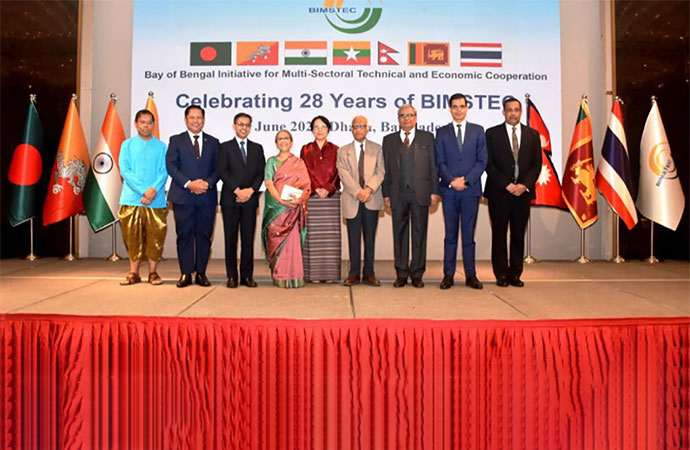




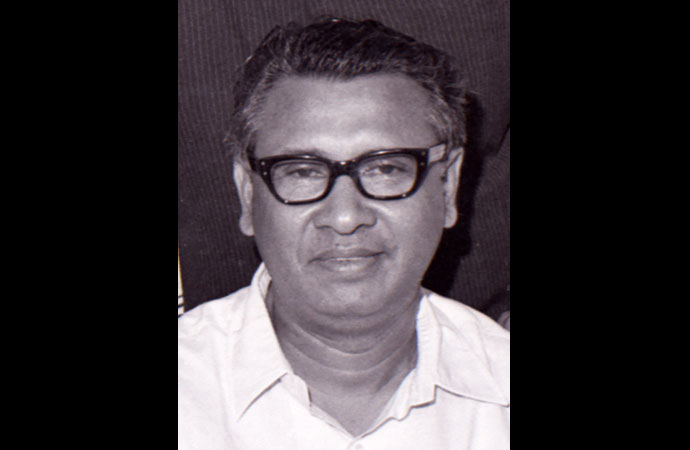
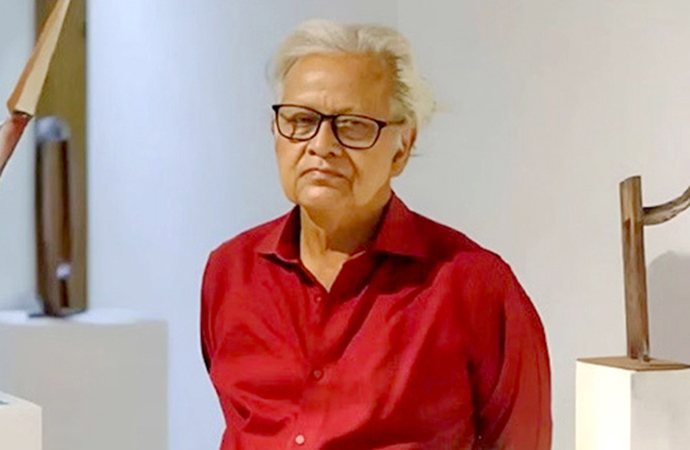






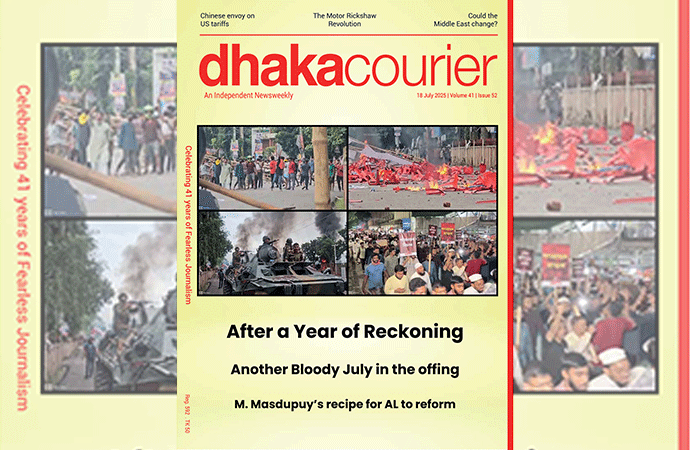
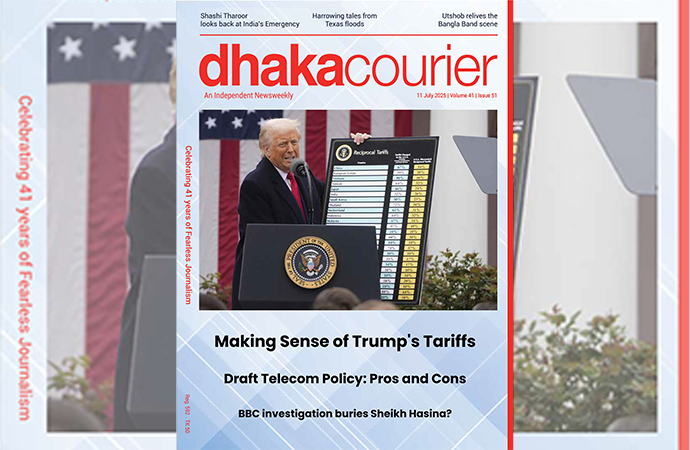

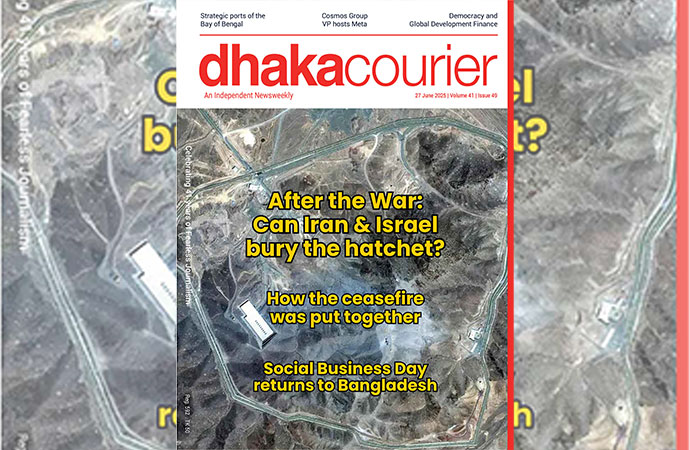
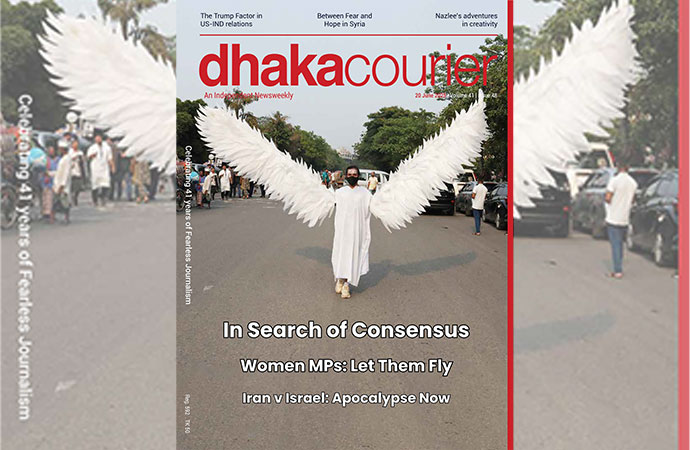
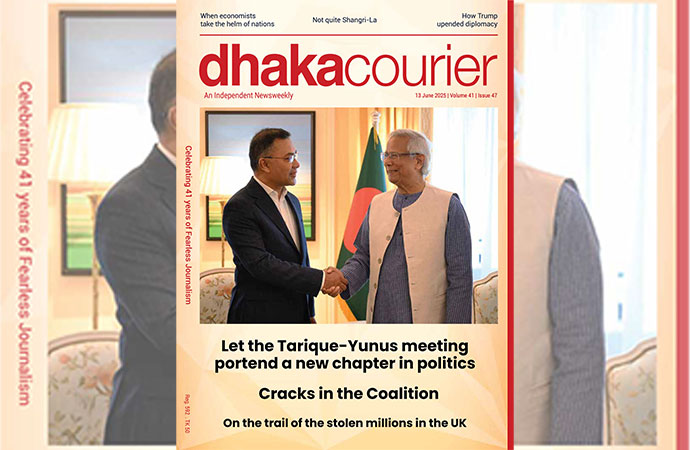
Leave a Comment
Recent Posts
Wrestling legend Hulk Hogan di ...
Hulk Hogan, the iconic mustachioed showman who helped transform profes ...
‘Punoray: shaping the future, ...
In a compelling initiative that seeks to bridge art, craft, and the st ...
Rangamati mourns death of Ukya Ching Marma in Milest ..
Uttara plane crash: A guardian’s last act of love
BIMSTEC for addressing security challenges that hind ..
The longest week yet, in Bangladesh 2.0